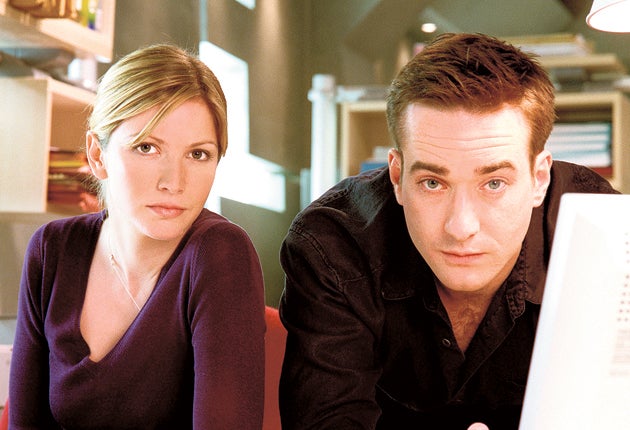Death, double-crosses and betrayal: Spooks to end after 10 years
The BBC series drew criticism for its violence and convoluted plots, but also helped MI5's recruitment

Your support helps us to tell the story
From reproductive rights to climate change to Big Tech, The Independent is on the ground when the story is developing. Whether it's investigating the financials of Elon Musk's pro-Trump PAC or producing our latest documentary, 'The A Word', which shines a light on the American women fighting for reproductive rights, we know how important it is to parse out the facts from the messaging.
At such a critical moment in US history, we need reporters on the ground. Your donation allows us to keep sending journalists to speak to both sides of the story.
The Independent is trusted by Americans across the entire political spectrum. And unlike many other quality news outlets, we choose not to lock Americans out of our reporting and analysis with paywalls. We believe quality journalism should be available to everyone, paid for by those who can afford it.
Your support makes all the difference.Agents frantically "raced against time" to prevent bombings, assassinations and kidnappings by terrorists. Back at headquarters, their colleagues tracked the unfolding dramas on electronic gadgets with stern faces, occasionally breaking into twitches of emotion. The twists and turns of every plot involved double if not triple or quadruple crossings, and multiple betrayals.
Click HERE to view graphic (194k jpg)
After a decade on air, Spooks, it was announced yesterday, is being retired by the BBC at the end of its next series starting in September. The programme's maker, the production company Kudos, said it had reached a natural end and was being concluded to reflect "the changing world around us".
Spooks, of course, has little to do with real life, and the storyline behind many of the episodes is often risible. But visits to MI5's website triple from 500 to 1,500 an hour every Monday night when the show is on, and the rising number of applications to join the service is at least partly credited to the series.
Spooks came at just the right time for MI5. The end of the Cold War had resulted in a scramble for curtailed resources among the various agencies, with turf war skirmishes breaking out. The 9/11 attacks announced the arrival of Islamist terror to the public, and the security service could be shown to be in the forefront of countering the threat.
Those in the other arms of the security field, MI6 and GCHQ, were at first dismissive of the series. But as its popularity continued to rise, there were mutterings that they, too, should get in on the act. Scriptwriters were sounded out and projects embarked on, but Spooks sailed on from strength to strength.
Part of the draw of the show has been its portrayal of action, often of a fatal kind. In the very first series agent Helen Flynn, played by Lisa Faulkner, died by having her head plunged into boiling fat. In another episode Ros Myers (Hermione Norris) was blown up while trying to rescue a drugged Home Secretary, but not before she had shot Jo Portman (Miranda Raison) while she was restraining a terrorist.
Some of the scenes led to complaints from viewers, but also to publicity for MI5. Some media suggested the mayhem was making women worried about joining up, creating a staff ratio of 41 per cent female to 59 per cent male.
A "senior Whitehall source" told one newspaper: "Spooks is a great TV show, but the violence can put women off applying for jobs at MI5... A career in the Service is about brains, not brawn." The Service, meanwhile, let it be known that one recurring question on its website was, "How realistic is Spooks?"
MI5 has, of course, had a number of women in senior positions, including two high-profile director generals, Dame Stella Rimington and Dame Eliza Manningham-Buller. The latter, in particular, has attracted controversy and at the same time gained kudos for helping to expose the falsehoods propagated by the Blair government over Iraq, and for speaking out about the torture of terror suspects by US authorities.
An indication of how spy drama has become interwoven with real-life spying came in Dame Eliza's critique of America's conduct, in which she implied that the leadership in Washington was inspired by the macho Jack Bauer, played by Kiefer Sutherland in the series 24.
Two of the longest-serving characters in Spooks, Ruth Evershed (Nicola Walker) and Harry Pearce (Peter Firth), will have central roles in the final series. The two spies are involved in an unrequited romance which may finally be resolved. But this is Spooks, after all, and the BBC's controller of drama, Ben Stephenson, said it would bow out with "a fittingly high-octane, thrilling finale". Firth said gloomily: "They could kill me at some point. I wouldn't rule it out."
Subscribe to Independent Premium to bookmark this article
Want to bookmark your favourite articles and stories to read or reference later? Start your Independent Premium subscription today.
Join our commenting forum
Join thought-provoking conversations, follow other Independent readers and see their replies
Comments